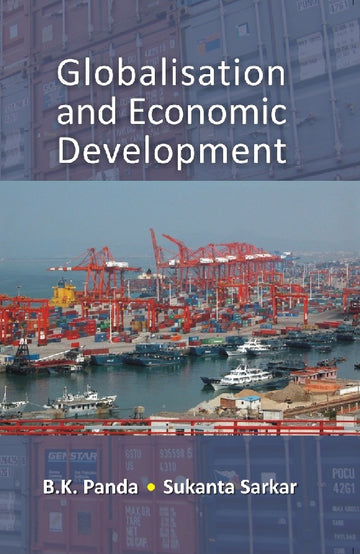Globalisation and Economic Development
Regular price
₹ 921
Sale price
₹ 921
Regular price
₹ 990
Unit price
Save 7%
| Item Weight | 400 Grams |
| ISBN | 978-9351281269 |
| Author | B. K. Panda, Sukanta Sarkar |
| Language | English |
| Publisher | Kalpaz Publications |
| Pages | 331 p |
| Book Type | Hardbound |
| Dimensions | 25 X 15 X 5 |
| Publishing year | 2015 |
| Edition | 1st |
| Return Policy | 5 days Return and Exchange |

Globalisation and Economic Development
Product description
Shipping & Return
Offers & Coupons
About The Book:- Globalisation is the process of international integration arising from the interchange of world views, products, ideas and other aspects of culture. The term globalisation has been increasingly used since the mid-1980s and especially since the mid-1990s. It is currently a popular and controversial issue, though often remaining a loose and poorly defined concept. Sometimes too comprehensively, the term is used to encompass increases in trade and liberalisation policies as well as reductions in transportation costs and technology transfer. Economic globalisation, the ongoing process of greater economic interdependence among countries , is reflected in the increasing amount of cross-border trade in goods and services, the increasing volume of international financial flows, and increasing flows of labour. Economic development is the sustained, concerted actions of policy makers and communities that promote the standard of living and economic health of a specific area. It is a wealth spent on country's population. Economic development can also be referred to as the quantitative and qualitative changes in the economy. The scope of it includes the process and policies by which a nation improves the economic, political, and social well-being of its people. It is hoped that the present edition of this book will be beneficial to all concerned of the society in general and students, lawyers, advocates, academicians, human rights institutions, researchers and NGOs working in economics finance field, in particular. About The Author:- Prof. B.K. Panda(MA, M.Phil, Ph.D) is working as professor & Head, Department of Economics , Berhampur University , Odisha. He has published various papers in reputed National and International Journals, lik e as. IUP Journal of Management Research, International Journal of Business Research, Indian Economic Journal, Apeejay Journal of Management , International Journal of Environment and Development, Indian Journal of Economics, Journal of Rural Development, etc. He has published various books in economics, lik e as Economic Reforms and Emerging Patterns of Employment , Consumption, Poverty and Inequality , Applied Demand Analysis, Serial Publications etc. He has also supervised many Ph.D and M.Phill scholars in economics. Dr. Sukanta Sarkar is working as Assistant Professor in Faculty of Management Studies , I C FA I University , Agartala Tripura, India. He did Bachelor and Master degree from Tripura University. He was awarded doctorate degree for his work on socio economic improvement of rubber tappers. He qualified UGC-NET Exam in December/2006. Currently he is Post-Doctorate Fellow (PDF) in De p a r t me nt o f Economic s, Berhampur University , Ganjam, Odisha. He presented many research papers in various seminars, conferences and symposiums. Various research papers have been published in foreign and national journals. He also previously worked as visiting lecturer in National Institute of Technology , Agartala & Tripura University. He has research interest in various topics like agricultural crisis, rural development, women empowerment, sustainable development and social problems. Content:- CONTENTS:- Preface 11 About the Contributors 13 Abbreviations 15 Part -I Globalisation 1. Globalisation: A Reality in 21st Century 21 S. K.Chaudhury & Sukanta Sarkar Introduction • What is Globalisation? • History of Globalisation • Significance of Globalisation • Measurement of Globalisation • Components of Globalisation • Globalisation in India • Effects of Globalisation • Problems of Globalisation • Small Scale Industry and Globalisation • Conclusion • References. 2. Globalisation and Status of Women in India: A Study 39 Prof. D.Pulla Rao Introduction • Gender Equity in the Constitution of India • Women at the National Level Politics • Women chief ministers of India • Gender Variations in Literacy Levels • Women in the Parliament of India • Women Representation in State Legislatures • Women Representation in Panchayati Raj Institutions • The New Initiatives • The Failures of the Government of India • Summary • Suggestions • References. 3. Global Export Crisis and Chiken Impact on the Poor in India: A Synthesis of Sector Studies 52 Shikha Chantia Introduction • Overview of the Chikan with Selected Sectors through Data • Chikken Craft• Key Findings • References 4. Women Empowerment and Microfinance: Bridging the Gender Gap 60 Krupa D. Bhatt Introduction • Gender Inequality and the Need for Women Empowerment • Micro finance and Women Empowerment: Global Perspective • Microfinance in India-Success and Flaws • SEWA Conclusion • References 5. Acceptance of Birth Control Methods: The Prevailing Pattern among Yerava Tribe in Karnataka 73 P. Prabhuswamy• Introduction • The Context • Karnataka Scenario • Awareness and Acceptance of Birth Control Methods among Tribes • The Pattern among Yeravas • Objectives • Methodology • Analysis and Findings • Type of Contraceptive Methods Opted by the Yerava Women • Conclusion • References. 6. Economic Development in India: Progress and Challenges 90 Prof. R.Prasad & Dr. Sukanta Sarkar Introduction • What is Economic Development? • Indicators for Economic Development • Economic Development in India since Independence • Five Year Plans • Finance Commissions • Centre State Financial Reforms • Conclusion • References 7. Globalisation and Poverty Eradication: An Assertive Approach in 21st Century 109 Dr. Deepali Singh Introduction • Causes of Poverty • Poverty in India • Government Policies • Below Poverty Line • Conclusion• References 8. Changes of Economic Sectors in India: Progress and Challenges 120 Dr. Rakesh Joshi & Dr. Sukanta Sarkar Introduction • Types of Economic Sector • Importance of Economic Sectors • Economic Sectors of India: Changing • Conclusion • References 9. Effects of Globalisation on Language lecturer's of international postgraduates language and academic culture in National University of Malaysia 137 Md. Momtazur Rahman Introduction • Notions of Language Needs Analysis • Language Needs Analysis • Components of Language Needs Analysis • Target Situation Analysis • Present Situation Analysis • Academic Culture and Some Studies on Academic Culture • Research Methodology • Sample involved in the Study • Semi-structured Interview for the English Language Lecturers •Administration of the Interview • Analysis of the Qualitative Data •Analysis and Discussion of Language Lecturers' Interviews • The Profiles of the Interviewees: General Information • Reading Skills in English • Writing Skills in English • Listening Skills in English • Speaking Skills in English • Differences in Academic Culture •Discussion of Findings • Conclusion • References Part II Economic Development 10. Sustainable Development and Society: An Overview 159 P.K.Pandey & Sukanta Sarkar Introduction • What is Sustainable Development? • Benefits of Sustainable Development • Sustainable Development in India• Conclusion • References 11. Changing Identity of Indian Cinema 172 Patil Vijay Ramchandra Introduction • Ethnographic Audience Analysis • Dream worlds and the Forces of Globalisation • Globalising Indianness • Globalisation of Firm Song-Dance • Resistance and Pleasure of Bollywood • References 12. Educational and Health Status of Scheduled Tribes in Andhra Pradesh 192 Prof. D.Pulla Rao Introduction • The Data and Methodology • Educational status of Head of the households • Educational levels • Literacy levels • Distribution of the drop out children (below 14 years age) from their education • Distribution drop out children • Distribution of households• Child (0-5 years) immunization status• Distribu tion of reproductive age (15-49 years) women • Gender wise distribution of diseased persons • Age wise distribution of diseased persons • Distribution of sample population • Distribution of diseased persons • Opinion of the sample households• Awareness about the AIDS• Distance to the medical center • Conclusions • Policy Implications • References 13. Women Empowerment: A Way of Economic Development 206 Prof. N.G.Pendse & Dr. Sukanta Sarkar Introduction • What is Women Empowerment? • Importance of Women Empowerment • Women's Empowerment Principles • Women Empowerment in India • Women Empowerment through Education •National Mission for Empowerment of Women • Millennium Development Goals • National Policy for Empowerment of Women • Protection of Women from Domestic Violence Act, 2005• Compulsory Registration of Marriage Act, 2006 • Sexual Harassment of Women at Workplace Act, 2013 • The Criminal Law (Amendment) Act, 2013 • Constrains for Women Empowerment • Conclusion • References 14. Sustainable Landscape Management in Bangladesh 229 Prof. Mohammed Ataur Rahman Introduction • Methodology • Physiography and Landscape of Bangladesh • Traditionally Managed Landscapes • Reasons for Changing Landscape • Impacts of Landscape Change • Detailed Study and Description of Impacts of Landscape Changes • Loss of Biodiversity • Socio-Economic Condition •Landscape Management • Preservation of Natural Undulations and to Pography •Protection against Further Disturbances of the Landscapes• Identification of the Causes of Detrimental Changes and Effective Measures to reduce them • Protection of existing water bodies and excavation of large and deep water bodies • Protection and Conservation of Woodlands and Homestead Forests • Control of Topsoil Erosion •To Minimize Irrigation Dependent Cropping Culture • Shelterbelts with Appropriate Plant Species • Proper Planning for Urbanisation • Development of Navigation System • Conclusion • Recommendations • References. 15. Anxiety Level among the Married Women 281 Prof. Farzana Alim & Mariyam Fatima Introduction • Objective of the study • Methodology • Result and Discussion • Facility Gap Assessment • Geographical Challenges • Human Resource • Training Need Gap • Infrastructure Gap • Essential Equipments Gaps: • Drugs and Supplies Gap: •Additional Expenditure during Institutional Delivery: • Gap in Knowledge, Attitude and Practice in Community • Pregnant and High Risk Pregnant Women • Conclusion • References 16. Incorporating CCE at Pre-service Teacher Training Curriculum 291 Dr. Ritu Sharma & Dr.Sangeeta Solanki Introduction • Need and Signature of the Study • Statement of the Problem • Operational Definitions of the Specific Terms • Objectives of the Study • Method of Research • Conclusion • Educational Implications • References 17. Quality of Life of Adolescent Girls (16-18 Yrs) and Its Associate Co-relates 297 Prof. Farzana Alim and Moulaey Zainab Introduction • Statement of the Problem •Aims and Objectives of the Study • Instrumentation • Statistical Techniques • Result and Discussion • Educational Implications • References 18. Rubber Plantation: A Way of Changing Livelihood of Tribals 305 Prof. B.K.Panda & Dr. Sukanta Sarkar Introduction • What is Rubber Plantation? • Origin of Rubber Plantation •Rubber Plantation in India • Rubber Plantation and Income Source • Insurance Scheme for Rubber Plantations • Rubber Board • Conclusion • References Bibliography 318 Index 323 The Title 'Globalisation and Economic Development written/authored/edited by B. K. Panda, Sukanta Sarkar', published in the year 2015. The ISBN 9789351281269 is assigned to the Hardcover version of this title. This book has total of pp. 331 (Pages). The publisher of this title is Kalpaz Publications. This Book is in English. The subject of this book is Economic. Size of the book is 14.34 x 22.59 cms Vol:-
- Sabr– Your order is usually dispatched within 24 hours of placing the order.
- Raftaar– We offer express delivery, typically arriving in 2-5 days. Please keep your phone reachable.
- Sukoon– Easy returns and replacements within 5 days.
- Dastoor– COD and shipping charges may apply to certain items.
Use code FIRSTORDER to get 5% off your first order.
You can also Earn up to 10% Cashback with POP Coins and redeem it in your future orders.








